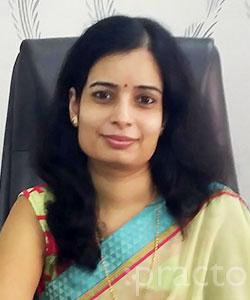
Dr. Jagrati Laad , experienced gynecologist of Wombs Fertility & Reproductive Health Clinic, Pune, offers In Vitro Fertilization (IVF) and Intracytoplasmic sperm injection (ICSI) for couples struggling with infertility. Dr. Jagrati Laad believes that every individual or couple deserves access to fertility treatments, and offers personalized care to create the best plan for each patient’s specific needs. Schedule a consultation today!
In humans, fertilization of the egg takes place in the uterus. The fertilized zygote then attaches itself to the walls of the endometrium. Thus a baby grows in the mother’s womb for 9 months before the delivery. But, certain circumstances may require this fertilization process to be initiated outside the body.
In vitro fertilization, or IVF as it is popularly referred to, is a laboratory-based process where eggs from a woman’s ovaries and male sperm are combined in a glass dish.
Intracytoplasmic sperm injection (ICSI) is a specialized form of in-vitro fertilization (IVF) used specifically when male factor infertility is present. ICSI involves the injection of a single sperm directly into an egg, ensuring that fertilization occurs. This technique has allowed couples to achieve pregnancy even in cases of severe male infertility.
The following conditions make you and your partner ideal candidates for IVF or ICSI:
In case of infertility, both male and female partners must consult Dr. Jagrati Laad . The doctor first has to establish the reasons for infertility. Very often, there may be more than one reason for this. Dr. Jagrati Laad does a thorough physical examination of both partners to assess their general health.
Dr. Jagrati does an internal checkup of the woman’s vagina in the presence of a nurse. The doctor also examines the man’s external male organs to look for abnormalities if present. The woman also has to go through sonography and MRI.
Since the process of coming to a diagnosis is elaborate, the couple has to pay several visits to the doctor.
Once infertility has been diagnosed, Dr. Jagrati Laad provides the couple with an individualized treatment plan. If Dr. Jagrati Laad recommends IVF and ICSI, the couple will be briefed about all the details related to these treatments.
Once the fertilization egg is achieved at the lab, it is transferred to the mother’s uterus. As the fertilized eggs are placed inside the mother’s womb, it attaches themselves to the uterine wall. Now it proceeds like a normal pregnancy.
Women are very often given complete bed rest to avoid abortion. The pregnant mother may need hormonal support to maintain pregnancy. She is asked to report to the doctor frequently to ensure the healthy growth of the baby. If the health conditions allow, normal delivery is preferred over surgical intervention or assisted delivery.
In case of an unsuccessful effort, the procedure can be repeated to achieve a successful pregnancy.
The ICSI procedure begins with egg retrieval, during which mature eggs are collected from the woman’s ovaries using a needle guide and ultrasound imaging. The partner’s sperm sample is then collected and prepared for injection. During this step, only the best quality sperm are selected for use in the laboratory.
Once the eggs and sperm are prepared, a single sperm is injected into each egg. The eggs are then monitored to ensure successful fertilization occurs and can be transferred back to the uterus as embryos three to five days later. Embryo transfer typically occurs within three to six days after the ICSI procedure. If any extra embryos remain, they can be frozen and used in future cycles.
Overall, ICSI is a valuable tool that has enabled couples to create healthy families, even in cases of severe male factor infertility. The process is highly successful and offers many potential benefits, making it an excellent choice for couples struggling with infertility.
The following are some of the risks of IVF:
Possible complications from ICSI include:
It’s important to discuss the potential risks and benefits with Dr. Jagrati Laad before beginning treatment. Dr. Jagrati Laad has many years of experience with this procedure and will ensure that the process is as safe and successful as possible for you and your partner.
The cost of IVF and ICSI varies depending on individual factors like the patient’s medical history, the specific treatment plan, and any additional procedures like genetic testing. Dr. Jagrati Laad will discuss the cost with you during your consultation.
Book ConsultationDr. Jagrati Laad MD is an accomplished Obstetrician and Gynecologist specialist in Infertility Treatment. She has a Master's Degree in Medicine from SSG Hospital and Government Medical College Vadodara and is certified in Ultrasonography by FOGSI (The Federation of Obstetric and Gynecological Societies of India). Her Fellowship in Infertility from the reputed Nadkarni Hospital and Test Tube Baby Centre, Vapi, Gujarat has given her hands-on experience in assisting couples with infertility issues. Dr. Laad is passionate about Infertility treatment, management of High-Risk Pregnancies, Hysteroscopy, Antenatal Care, Laparoscopic Surgery, Adolescence Gynecology, Family Planning, and Cancer Detection and Treatment. Her expertise and dedication to her specialty have enabled her to expand the horizons of her field.
Book Consultation
